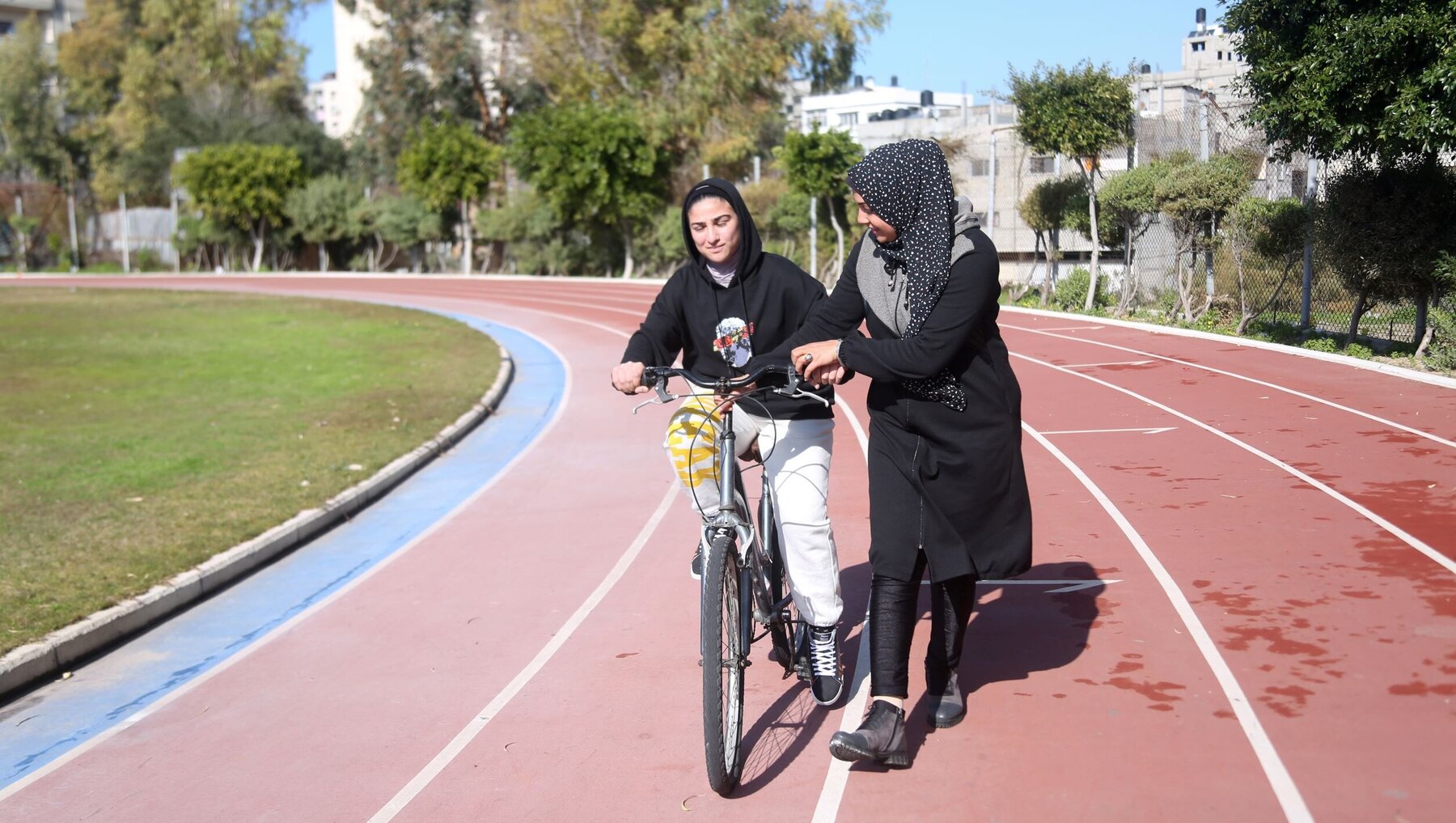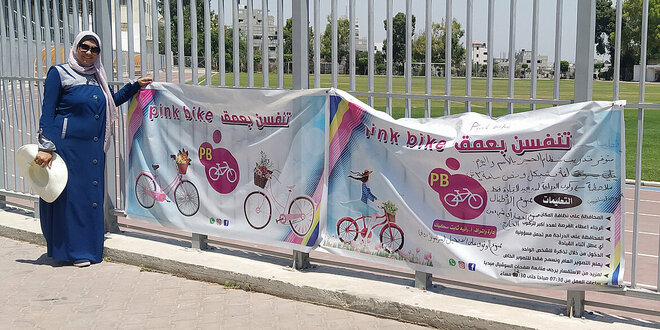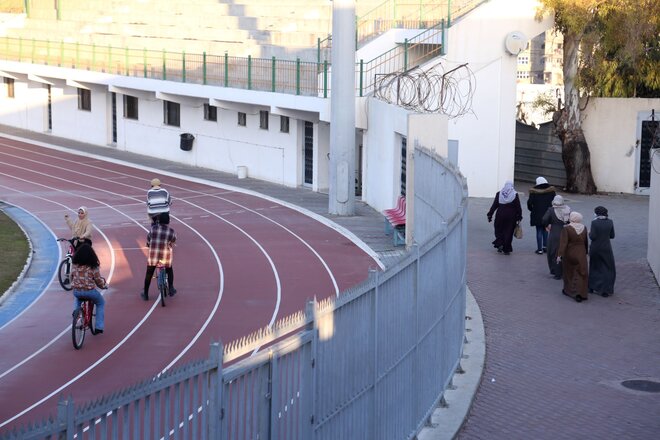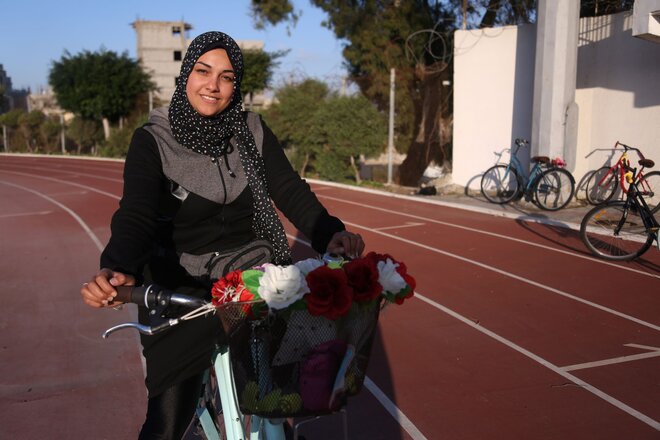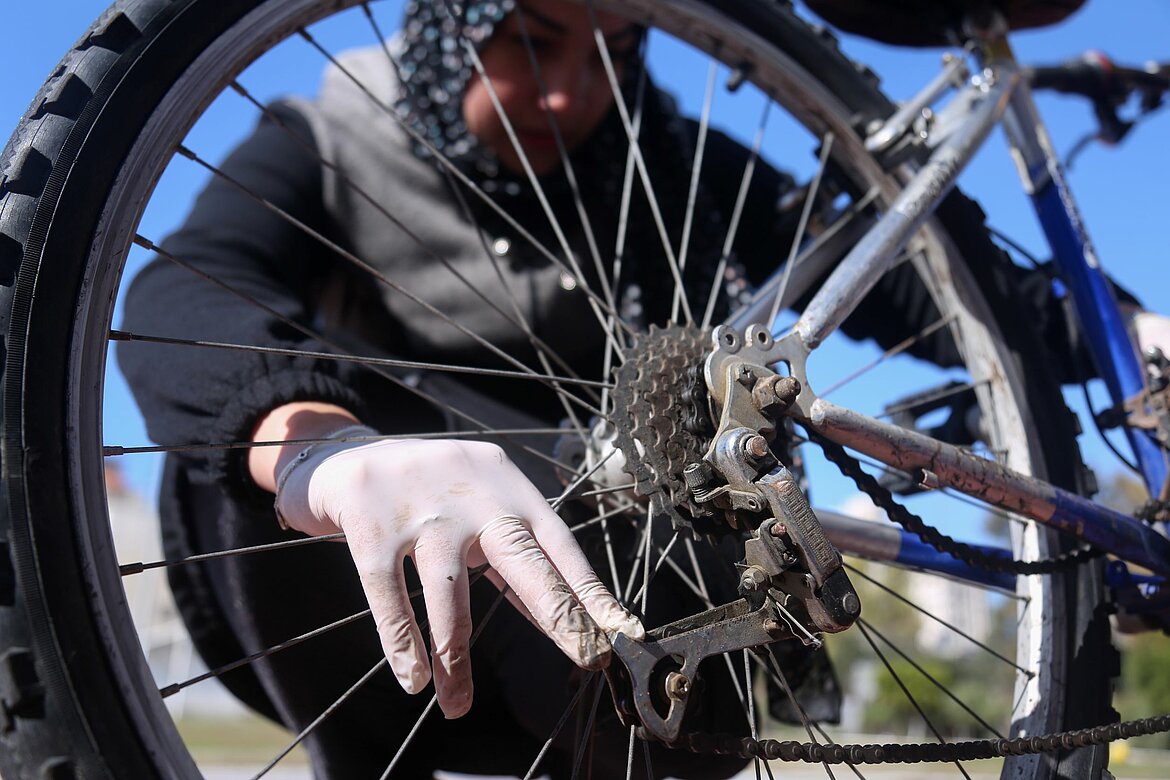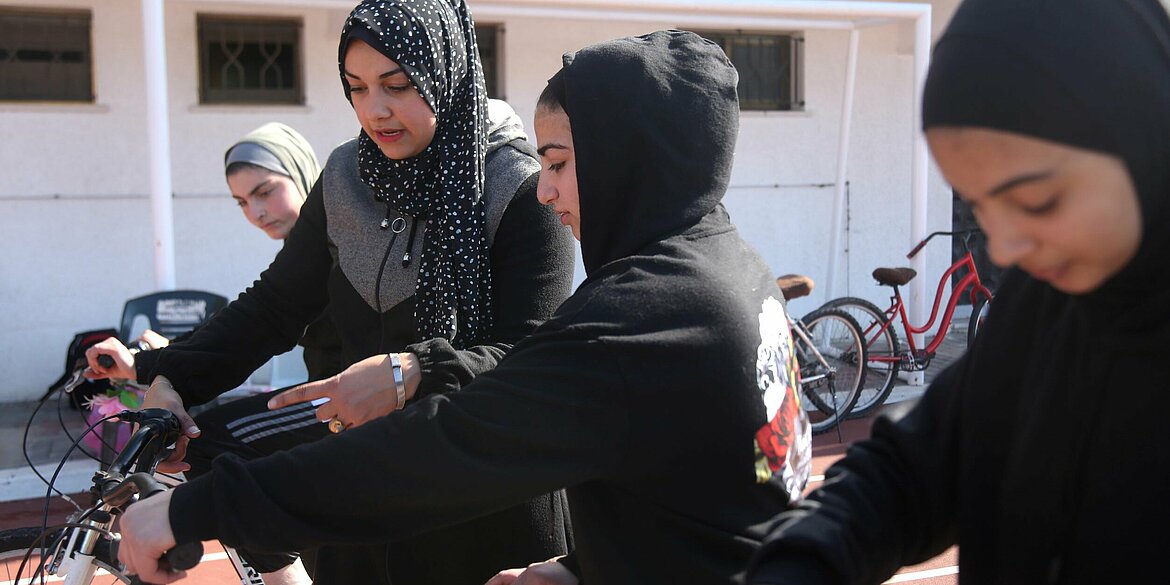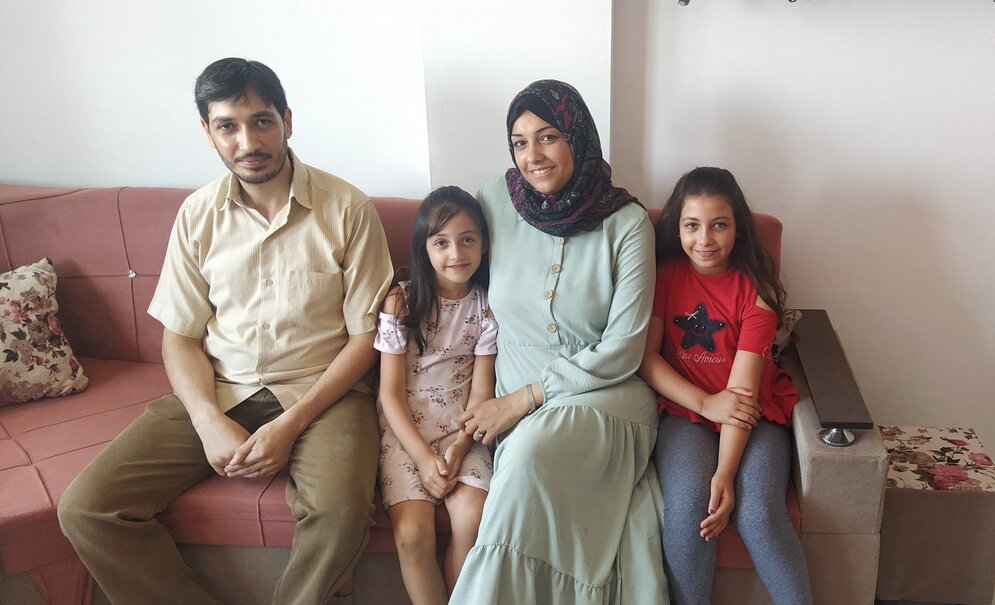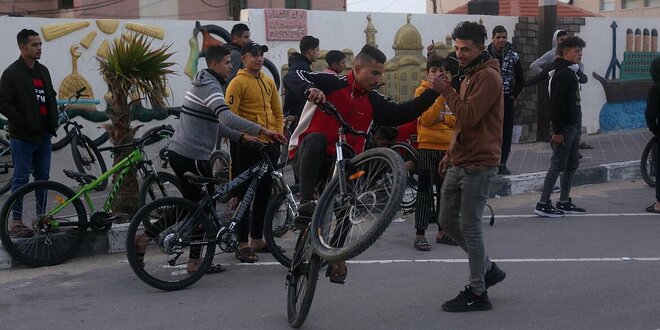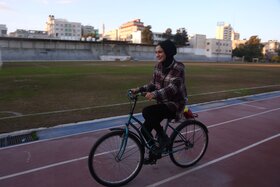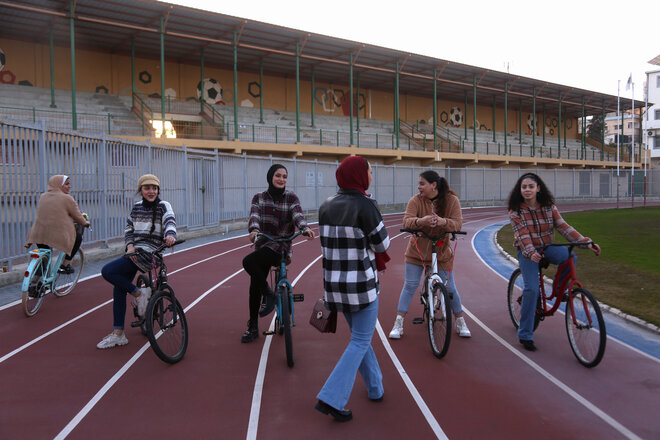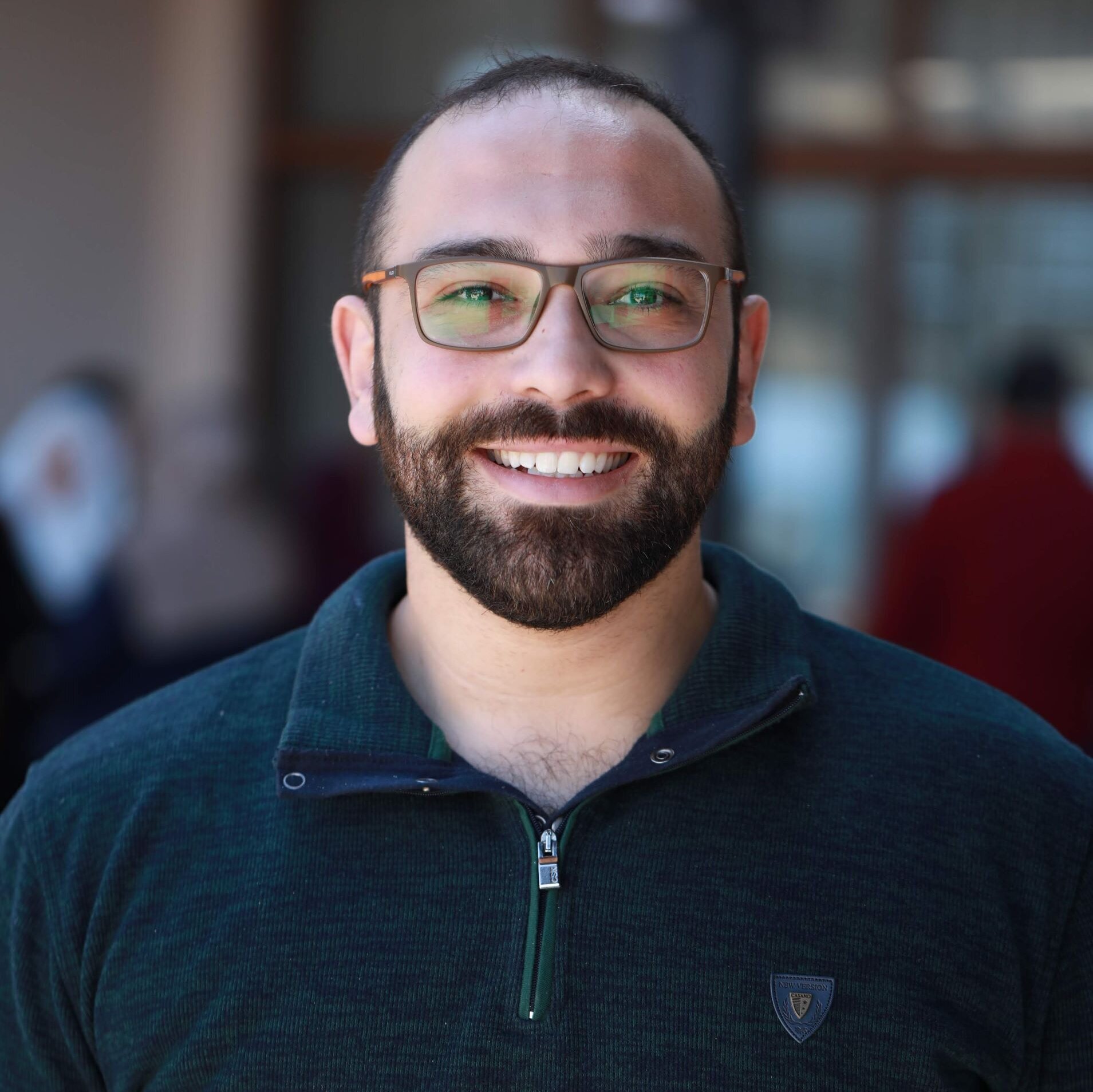This article was first published in the print version of the Frankfurter Rundschau on February 19, 2022.
After helping her daughter survive cancer, Rania Shaik dedicated herself to bringing joy to the women of Gaza by setting them loose on two wheels.
Raghad stands still and nervous in the Al Yarmouk playground in the Gaza Strip, looking at the red bicycle. Her hand, tattooed with a henna butterfly, runs over the handles before touching the basket at the front. Other women are around her, encouraging her onto the saddle and Raghad begins to hop a little on the grass before losing her nerve. "What if I fall?" she asks.
Raghad is 35 years old. The woman she is asking is Rania Shaik. Rania has made it her mission to teach the women of Gaza to ride bicycles, even if it is in the relative privacy of the playground. Rania understands just how conservative the Gaza Strip can be, where women aren't encouraged to participate in athletic activities, especially in the open air.
Women aren't encouraged to participate in athletic activities
When Rania was 12 years old, her brother bought a bicycle. She remembers being excited because she thought she would be able to ride it too. "My father told me: 'You are a young woman now, and it is not appropriate for you to ride bicycles in the street. What would people say?'" She looked around and saw no older girls riding bicycles in her neighbourhood. She sat by the window and watched her brother excitedly racing against his friends.
Such traditions put a lot of pressure on women and girls in Gaza. There are many jobs that women cannot do because they are 'men's jobs'; many women cannot travel outside by themselves or even make their own decisions. "Even when I go out with my husband and I decide to play with my children or laugh out loud, people around us give us judgemental looks," Rania tells me.
Strong female role models make a difference
Fortunately Rania had a strong role model in her mother Sahar, a tailor who worked hard to provide for her children. Sahar never surrendered to the stereotypes society demanded. "She would paint, fix the electrics and plumbing. She was a real example of determination," Rania says. When her brother was not at home, Rania would try to ride his bicycle on the balcony but the apartment was so small there wasn't room. On the television she saw girls and women riding bicycles freely. She vowed that one day she would ride one too.
These days Rania lives in a cosy apartment five floors up in Nasser Street. There is not a lot of furniture, and everything is neatly placed within the white and pink walls. She has been married for 11 years, to a man whose smile rarely leaves his face. "He's my rock," Rania tells me, looking at her husband lovingly. "He has been there through every obstacle and every challenge."
There have certainly been challenges. Rahaf, the first of her three daughters, fell ill with leukaemia when she was three years old. Rania had to put her life on hold as she ensured Rahaf was getting treatment.
A mother's dream since childhood
Her daughter not only survived but is now a healthy, strong and happy 10-year-old girl who wants to be an interior designer. "She is always coming up with new designs and decorations," says Rania. Tellingly Rania's second daughter, Hala, wants to be a paediatric doctor in order to save other children who are sick.
After Rahaf was out of danger, her mother decided to go to university. To help her, her husband took on another job in a supermarket in addition to working as an administrator. His only condition was that she should get a mark above 80 percent. She did. After graduating in basic education she tried to find a job, but living in Gaza, where the unemployment rate is 49 percent - a percentage that rises to 92 percent among young women - made that difficult.
Rania also knew that it would be almost impossible for her to have an 8 to 4 job - the standard work hours in Gaza - given she had to raise her children. So in October 2020 she took part in a programme led by an NGO that seeks to empower women and completed a course on starting a business. Later she received an award for preparing a viable plan and was given seed money. She had rekindled her dream of riding a bicycle, only now she wanted to create a space where all women could ride bicycles.
Sharing the dream of riding a bicycle
It turned out to be difficult to find good bicycles that were also affordable. She was set to launch the business in April 2021 but Gaza's borders had been closed so few products were coming in. She would wake at 6 a.m. to go and see bicycles she'd heard about, her husband driving her. She ended up buying ten, some used, others new.
"Some were of better quality than the others," she says. "Everyday I learn something new about what is good and what is not in terms of bicycles. And then I ran out of money, I did not want to ask anyone for help because I did not want to add an extra burden on them." Her mother and sister came by one day. "Each gave me some money that they had saved to go and buy what was missing," she remembers. "It was not just a mother and sister helping. It was women supporting women to achieve their goals."
Cycling as empowerment
In April, the day before the project was due to launch, Rania panicked. Sitting next to her husband, she asked: "What if I fail?" He smiled at her and said: "But what if you succeed?" The municipality had already agreed to lend her the playground. Her last great concern was how many women would join, and whether they would like it or not.
In 2016, a group of four women had started to ride bicycles in public. Even though they were celebrated by some, they were called names in the streets by others and, although they continued for a while, other women didn't follow their example.
When Rania had announced the project on social media, women had been interested. Some said they did not believe such a place existed; others said they were excited, but that didn't mean they would come. As it turned out, the place was full that first day. Women of all ages, and from all over, came to ride Rania's bicycles. She charged one dollar for 30 minutes and $1.50 for a full hour. So far, she has trained over 200 women how to cycle.
Providing an open and safe space for girls to play
Young girls would come in groups to race each other: "I would look at them and remember myself when I was their age and be happy that I was able to provide them with an open space to play - unlike myself who couldn't ride the bike at home."
Women in their 50s also came. One of them told Rania that 40 years before, when Gaza's homes were bigger and had more land around them, her father had taught her how to ride. She wondered if she would be able to remember after all these years, and to her surprise, the old saying proved true - you never forget.
A young woman thanked Rania "for bringing happiness into my life." And many women shared their dreams of having their own businesses: "One woman, who loves to skate, told me that my experience has encouraged her to believe that she could have her own project for women skating one day. Recently she joined me and now she teaches girls how to skate." Rania wants to keep expanding. She plans to increase the number of bicycles and add more activities.
"Women want spaces wehere they feel comfortable, free and active"
In the playground, Raghad is looking at Rania, waiting for an answer to her question: "What if I fall?" Remembering her husband's words, Rania replies: "But what if you succeed?"
At first Raghad struggles to get on the bike but eventually she is able to position herself well and sit properly. As Rania supports her, Raghad concentrates with great seriousness, as if she is about to take a hard test.
Her shaky legs begin to pedal. The bike sways wildly from right to left. After a couple of metres, she stops. But she does not lose hope. She goes back and after several trials - and much encouragement from those around her - she makes more ground. A grin, at first small, is followed by a giggle. She looks at Rania and says: "Oh God! I did it. I did it!"
Raghad will later tell me that given the many difficulties women face, they need a place like this to release their stress. "If you are lucky enough and have money, you can go to a restaurant. If you want, you can go to the sea. But women want spaces where they feel comfortable, free and active."
For the moment though, she is just looking at Rania with a blooming smile. "We did it," says Rania. "The women of Gaza did it."
The Author
More articles of the Author


